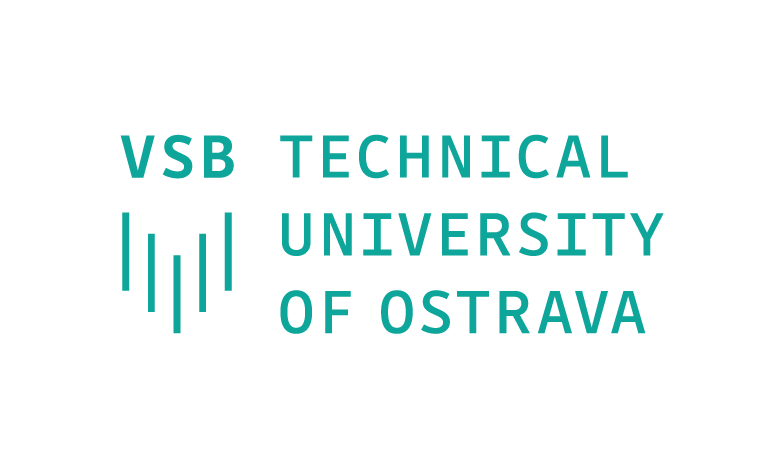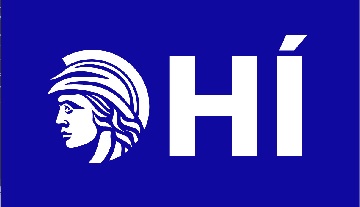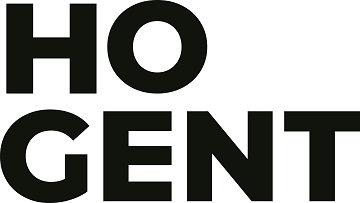News
Publication Remember To Remember: The international experience of prospective memory training (between theory and practice)
12.12.2024
In December, the team of authors presented the publication Remember To Remember: The international experience of prospective memory training (between theory and practice). Memory research and training is a frequent and popular topic in psychological research and practice. Yet the topic of prospective memory, i.e. memory for the future, is not well known in professional or lay discourse.
The international project Remember To Remember (2021-1-CZ01-KA220-SCH-000032703) involved teams from VSB-Technical University Ostrava, University of Iceland, Hogeschool GENT and Akademia techniczno-humanistyczna in Bielsko-bialej. The project focused specifically on training prospective memory in adolescents with learning difficulties and/or neurodevelopmental disorders. In the publication REMEMBER TO REMEMBER: The international experience of prospective memory training (between theory and practice) 2021-1-CZ01-KA220-SCH-000032703, a theoretical perspective on the topic of prospective memory training is offered and combined with practical findings from training conducted in the Czech Republic, Iceland, Belgium and Poland. Prospective memory falls among very important cognitive functions, therefore, training it throughout the whole life is of the highest importance.
The international experience of prospective memory training (between theory and practice)
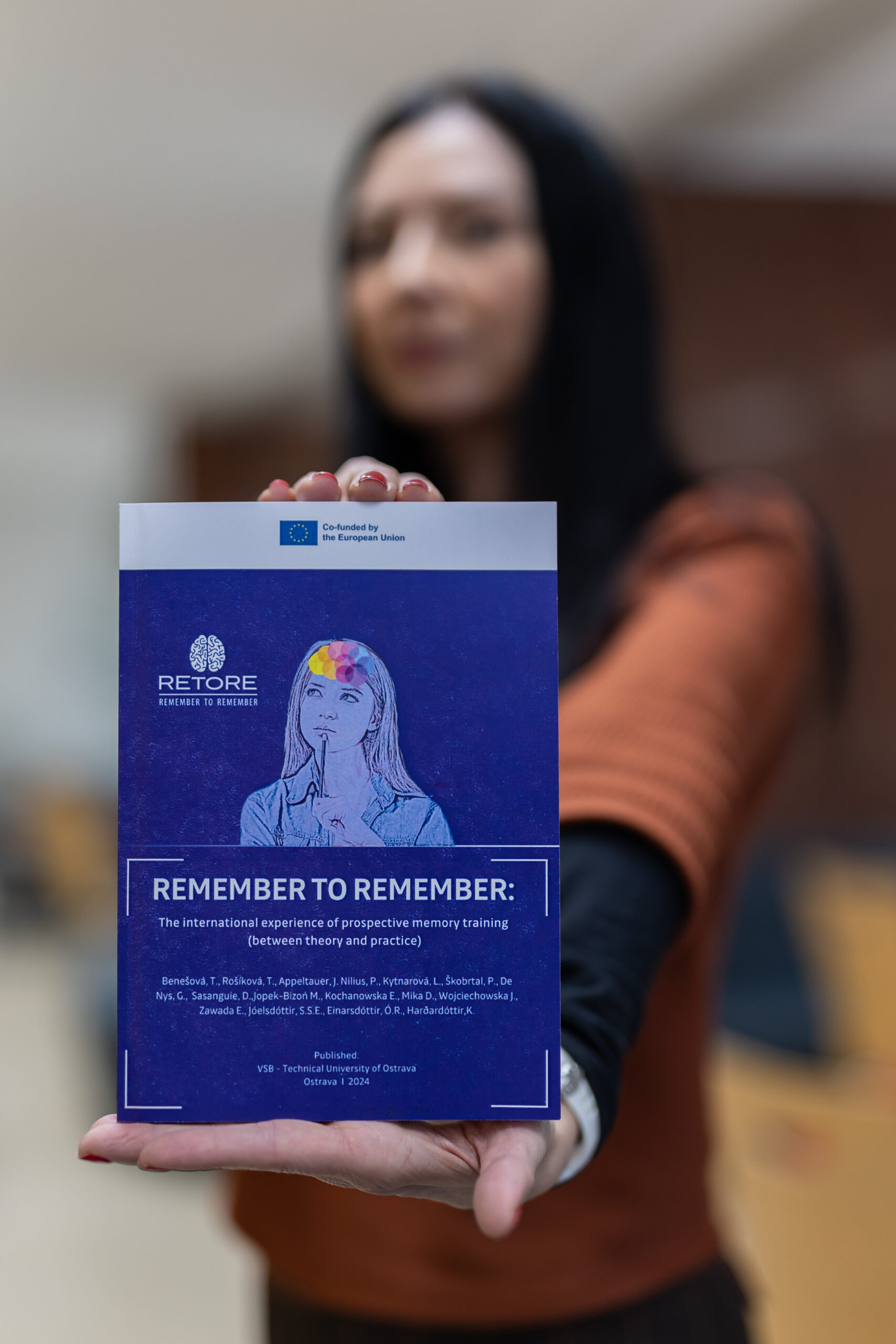
Multiplier Event in Iceland
3.12.2024
The Multiplier Event in Iceland was held on the 03.12.2024. The event took place in Áltanesskóli, the school that took part in the testing of the material with us. Most of the teachers form the school participated in the Multiplier event or 35 teachers.
The purpose of the event was to disseminate our findings from the project, explain the purpose of the project, how the kids did in the testing and give the teachers opportunity to examen the materials made for the project and test the proxy cubes.
Ther was a lot of discussions and questions – and the teachers were very enthusiastic about the project.
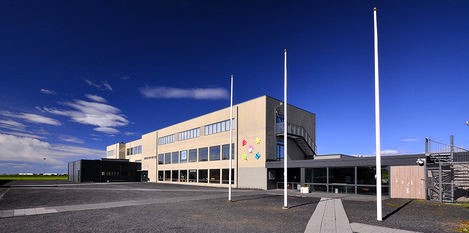
Remember To Remember Conference
29.11.2024
In November, a conference on Metacognition and prospective memory as tools for effective functioning in everyday life took place at the VSB – Technical University of Ostrava. The conference summarized the outcomes of the Remember To Remember project and at the same time introduced the topics of metacognition and prospective memory to the general and professional public. The programme featured, among others, Kamila Urban, an expert in cognitive and metacognitive development, clinical psychologist and psychotherapist Petr Nilius, neuropsychologist Tereza Rošíková. Special guest was Dominik Kniezek, a student with Asperger’s syndrome.
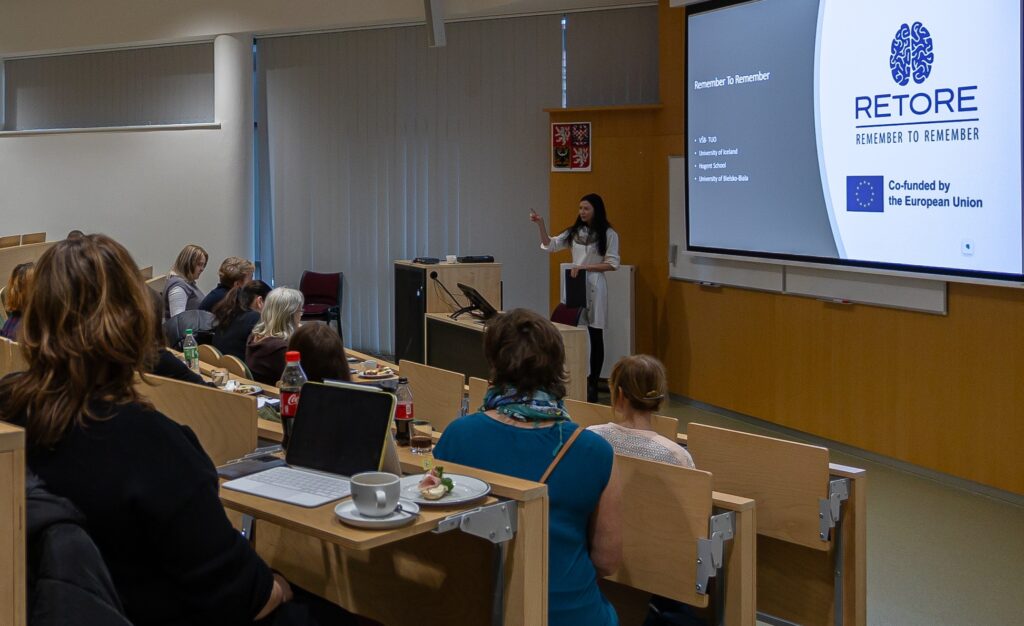
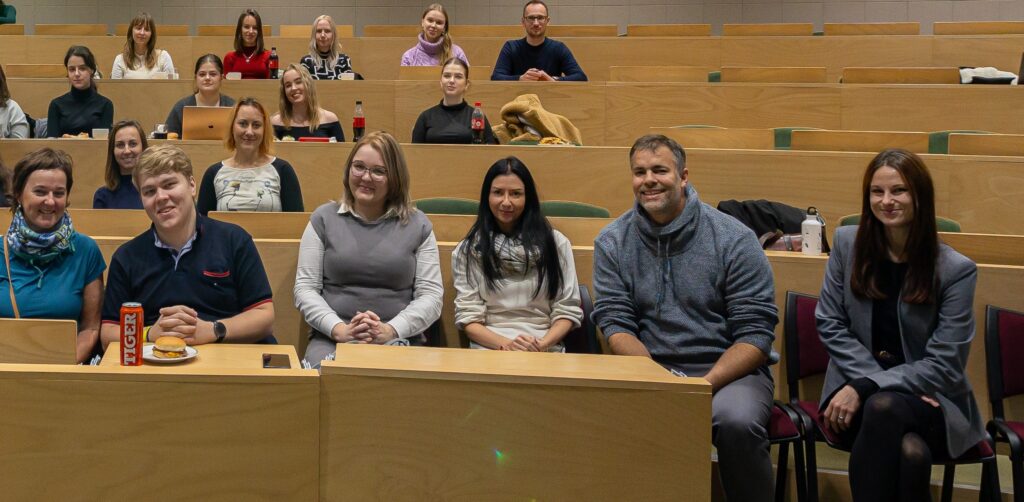
HOGENT School presented the results of the Remember To Remember project
19.11.2024
Giving and receiving inspiration during our study day Remember To Remember; the closing event of our Erasmus+ project on prospective memory, executive functions and metacognition in students with learning difficulties or disorders. Attendees eagerly tested the project’s test materials during the game carousel, shared practical info and materials at the inspiration market and heard the first research results.
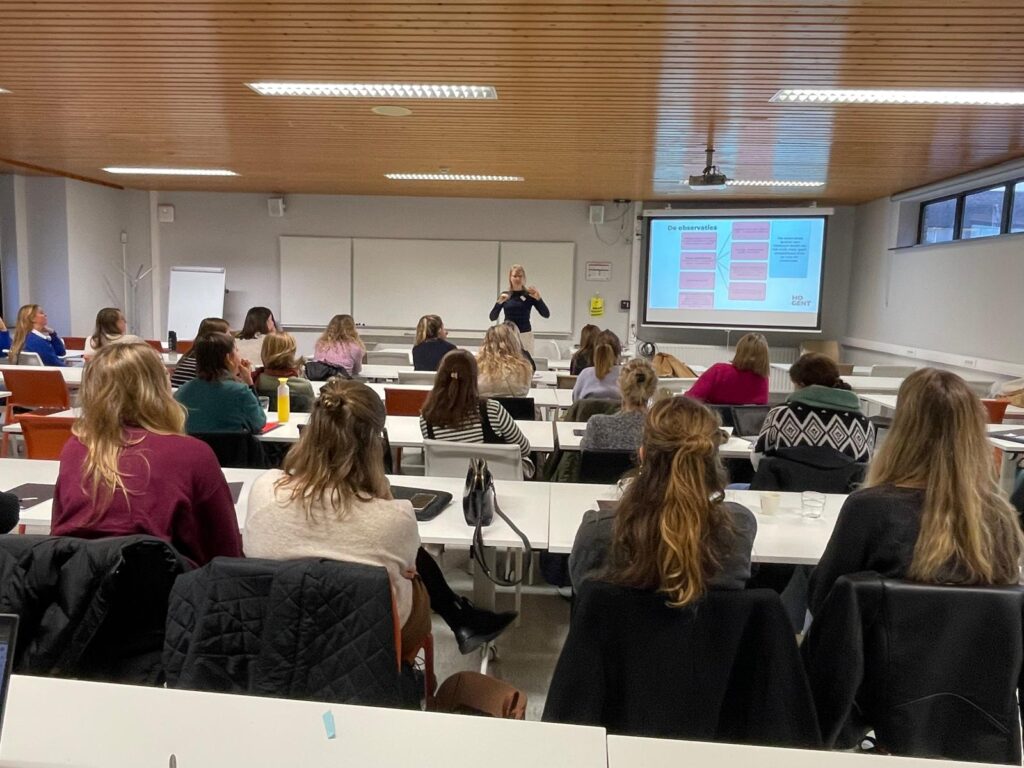
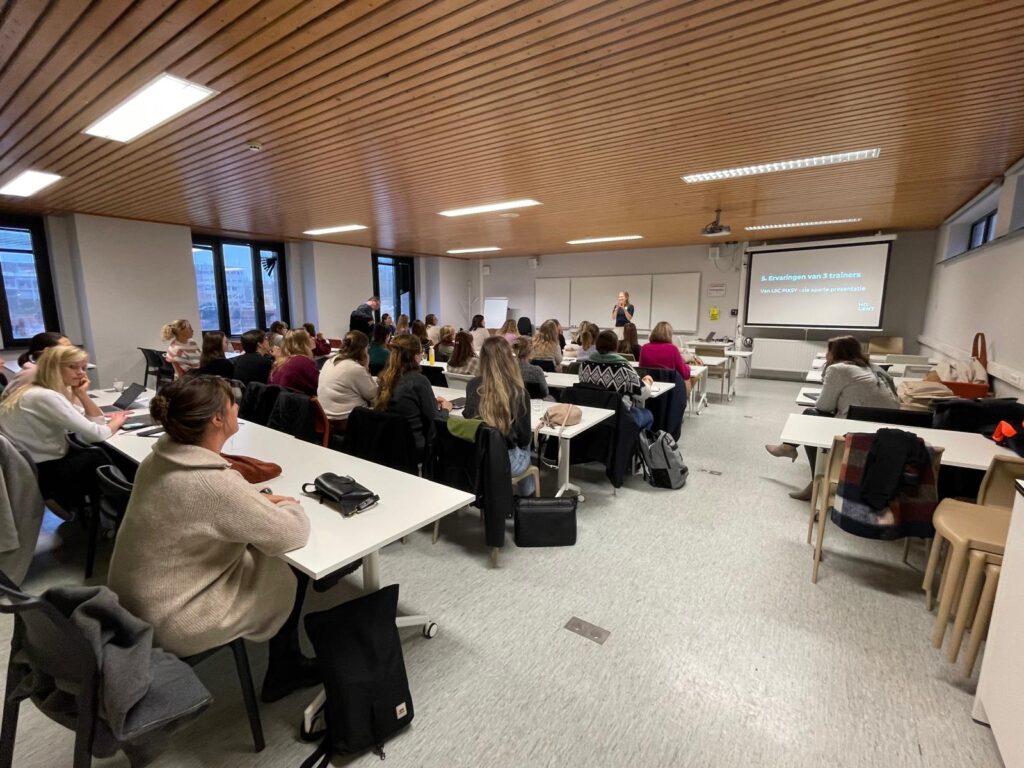
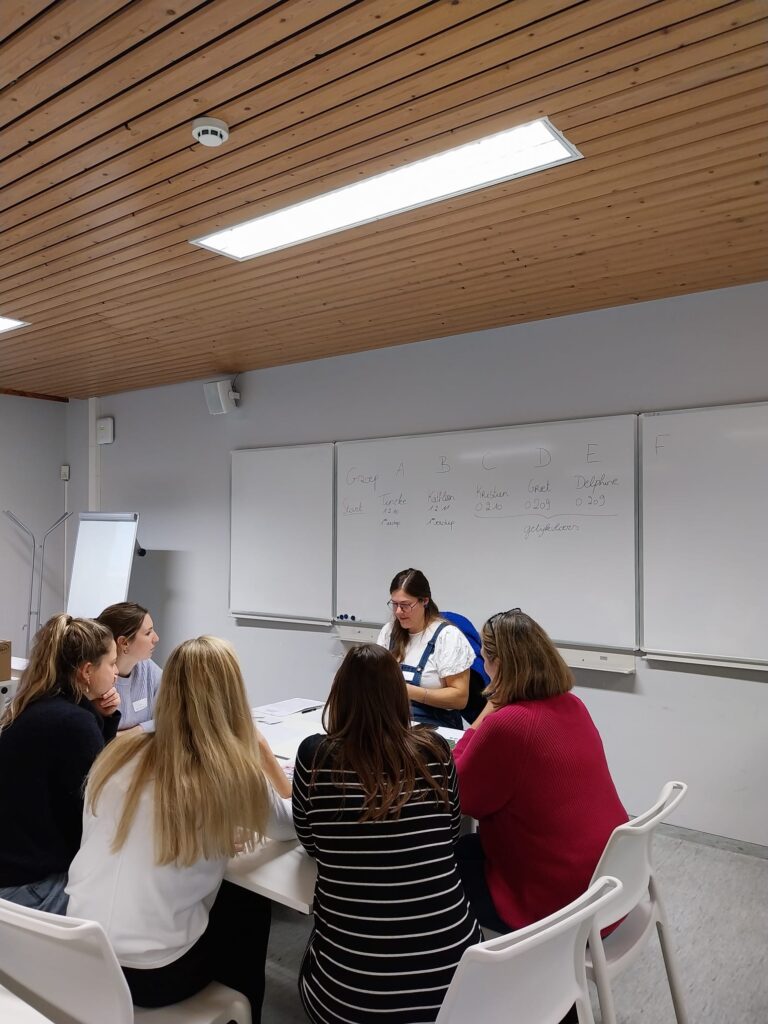
Presentation of RETORE project outputs in Poland
13.11.2024
On November 13th 2024, the University of Bielsko-Biala hosted a conference summarizing the intellectual results of the project entitled Remember to Remember, 2021-1-CZ01-KA220-SCH-000032703, financed under the Erasmus+ program, which was opened by the Vice-Dean of the Faculty of Humanities and Social Sciences, Robert Pysz, PhD.
The conference was attended primarily by teachers teaching in schools where children with special needs are taught, special education teachers, as well as people interested in the topic of the conference from the city and region.
In addition, the event was attended by employees of the Faculty of Humanities and Social Sciences and students of pedagogy, who in the future will take up work in various units related to teaching people with special educational needs or on the autism spectrum.
In total, over 70 people took part in the event during the entire day of the conference, including 32 from outside the University of Bielsko-Biala.
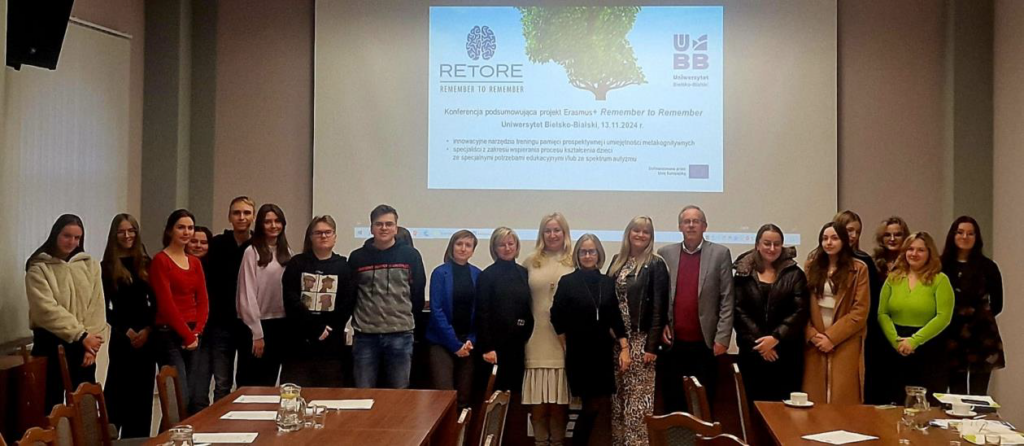
Remember To Remember project prezentation in Bielsko-Biala
In April dr Małgorzata Jopek-Bizoń made two trainings with R2R intellectual project results in Bielsko -Biala.
The first one was organized for the students from English philology (teachr grpu) and pedagogy, they were analyzing the Executive functions and prospective memory sheets, trying in pairs to run the research and replacing their roles.
The second training was undertaken at Specjalny Ośrodek Szkolno-Wychowawczy im. Marii Grzegorzewskiej w Żywcu, where pedagogies, psychologists and teachers were trained and explained how to use Proxy BQ and executive functions and prospective memory tools.
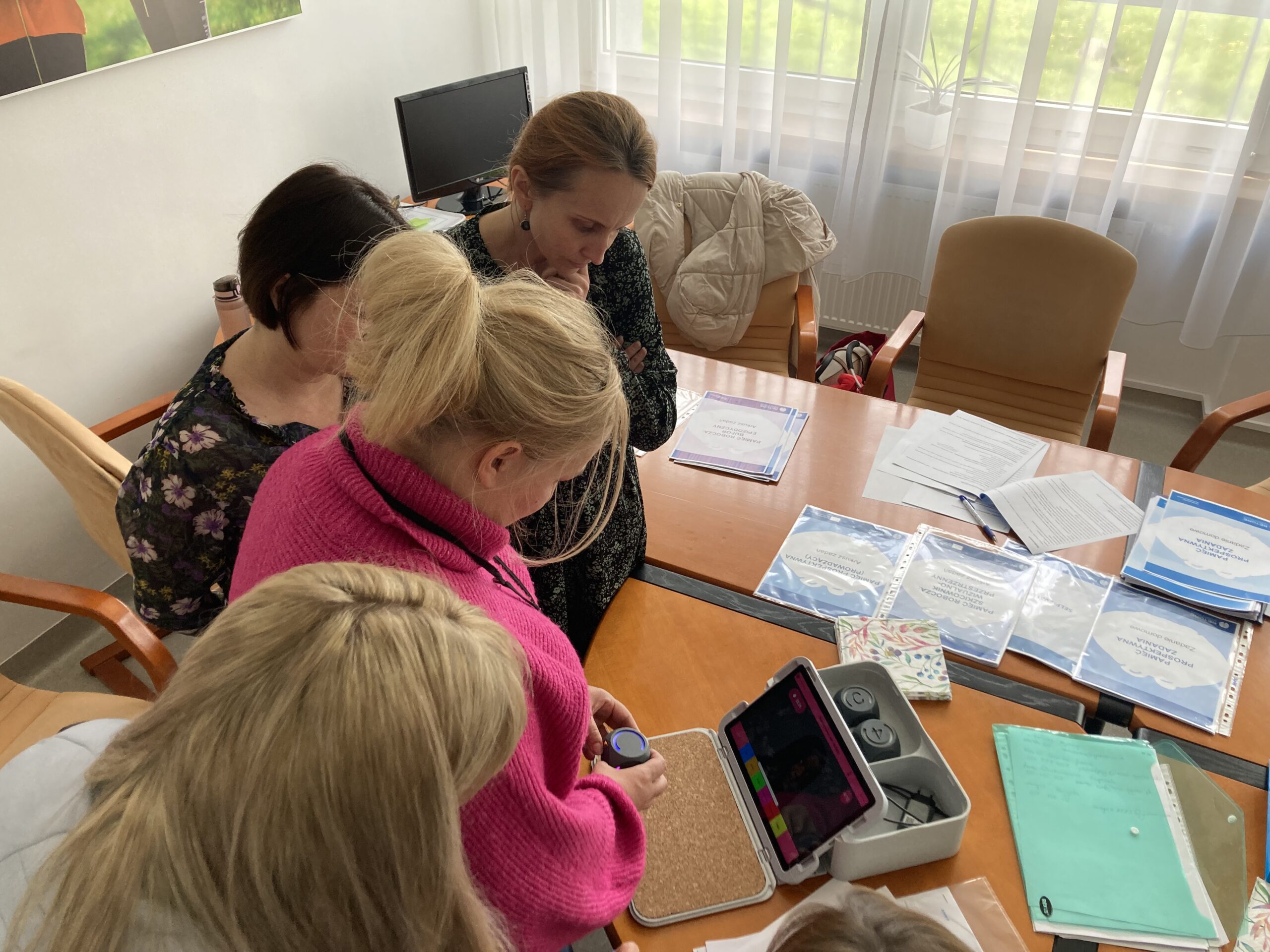
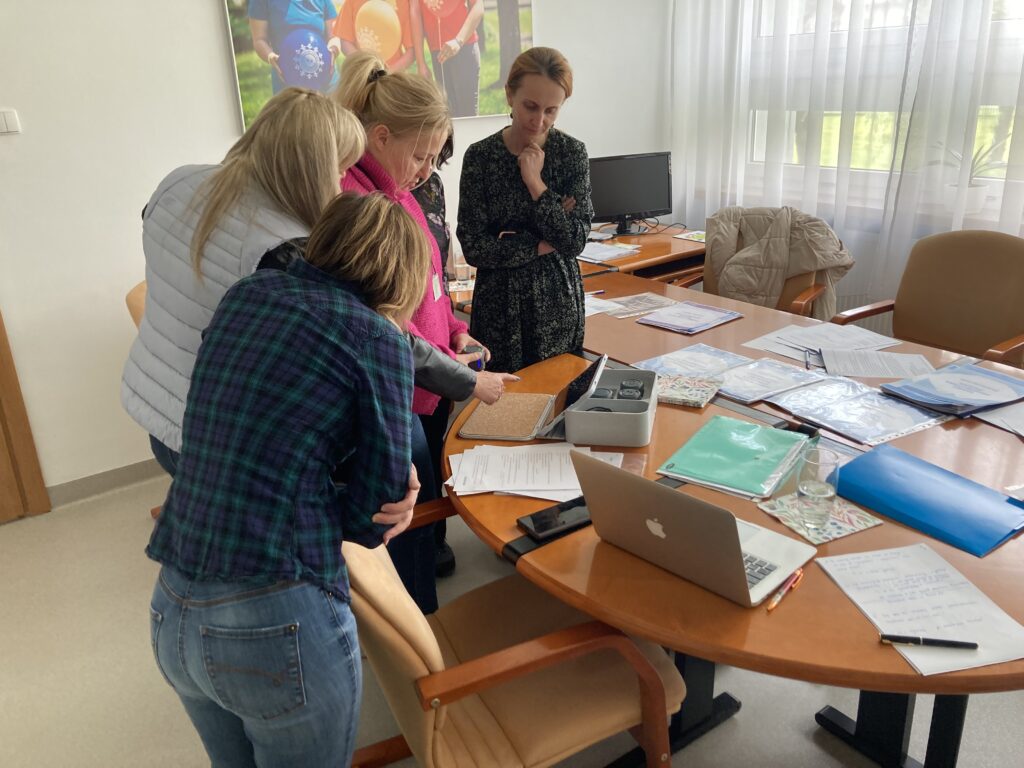
Remember To Remember meeting in Ghent
From 29th to 31st August, a learning, teaching and training activity took place at the Hogent School in Ghent, Belgium. During the meeting, participants from four countries were introduced to the concept of executive function training and prospective memory. Participants learned how to use the PROXYQB evaluation and training cubes and were introduced to the therapy worksheets. At the same time, the Belgian partners introduced the Eureka Leuven, an innovative knowledge and expertise centre for learning disabilities and problems in learning with the central theme ‘From Mankind to Talent’.
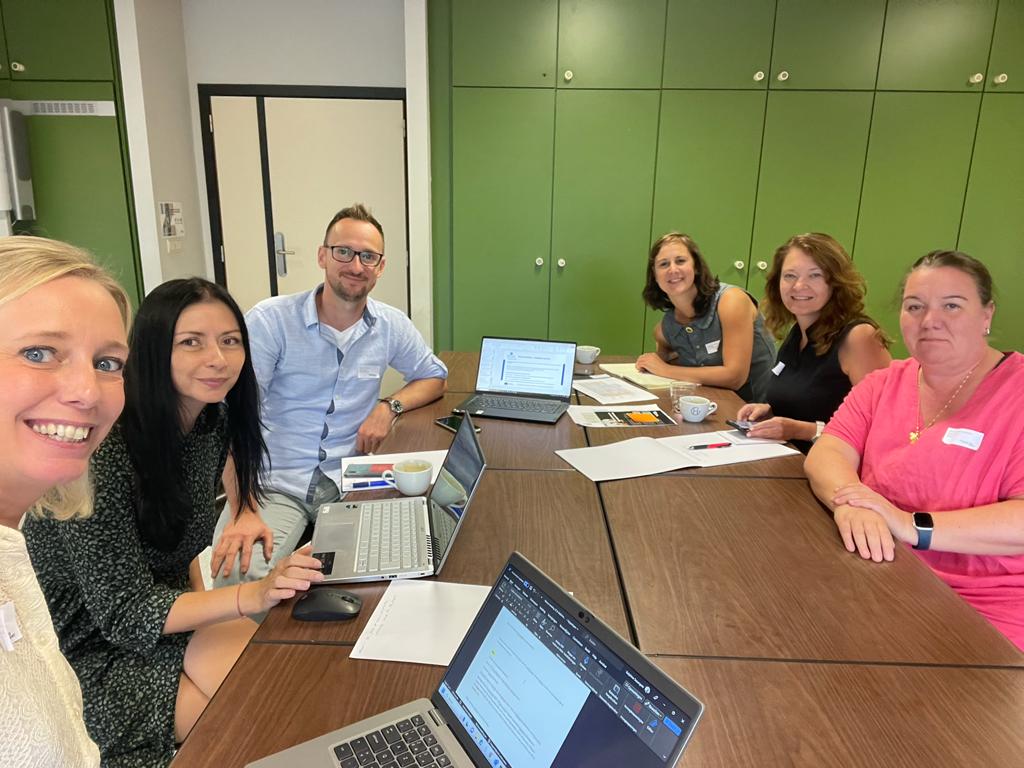
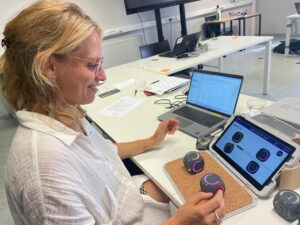
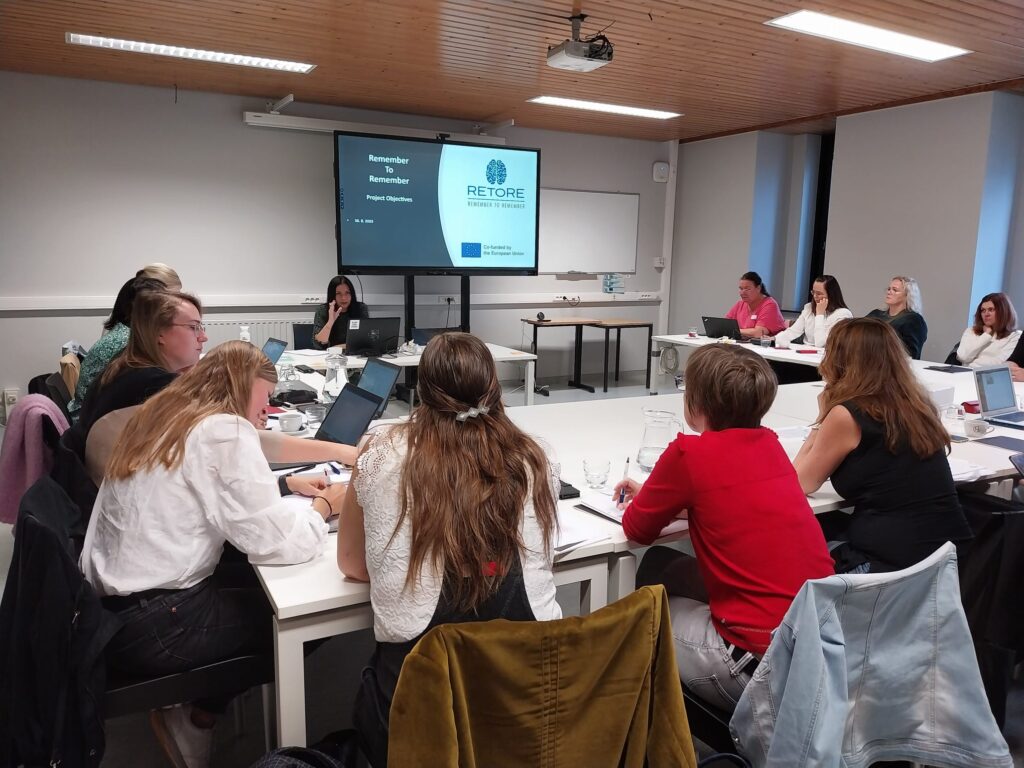
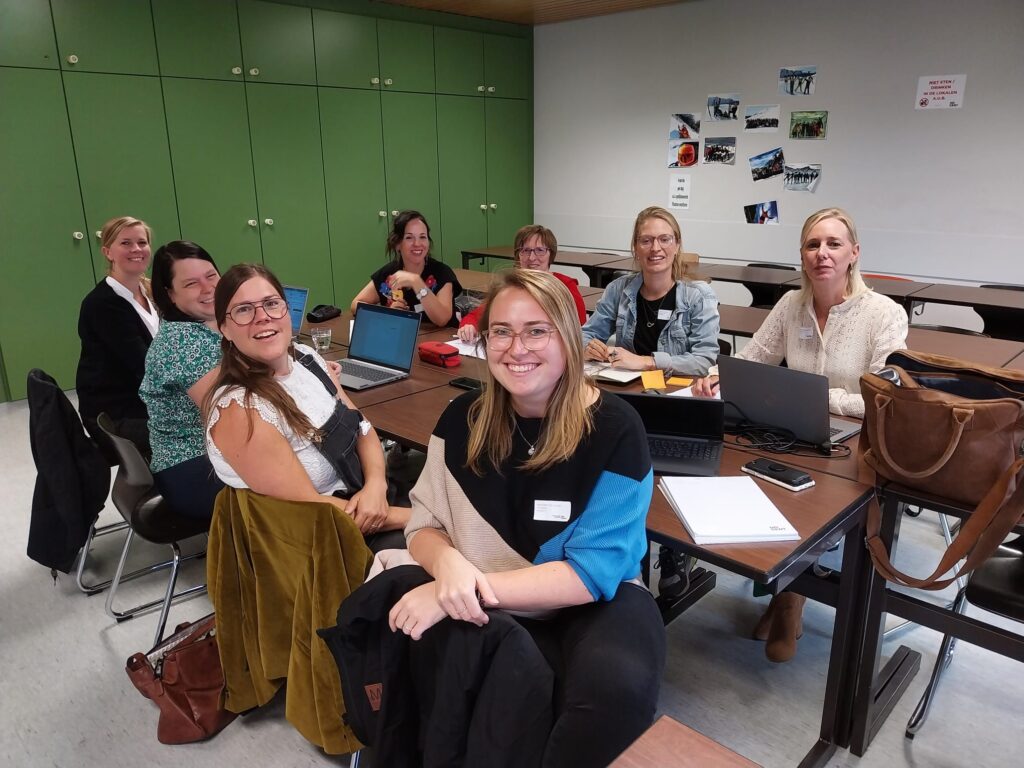
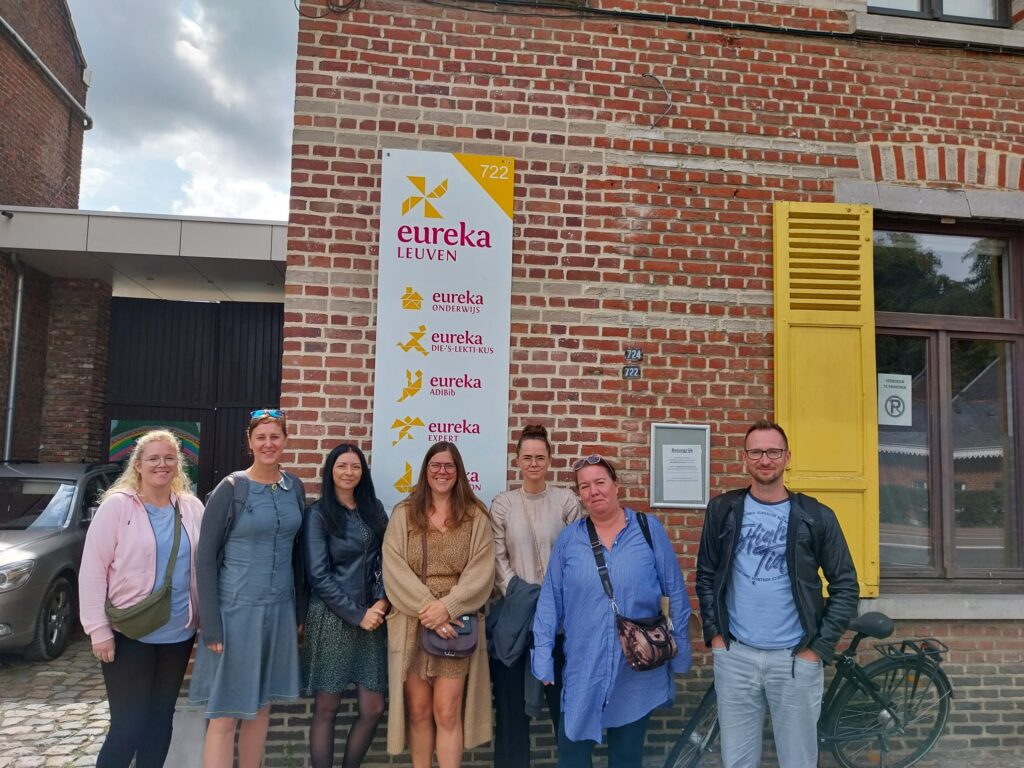
Presentation of the project ReToRe as part of the Brain Week 2023 (14.2.2023)
The Remember To Remember project was presented at the national event Brain Week in the Czech Republic. On March 14, 2023, a workshop was held on the topic of neurorehabilitation as a complex and multidisciplinary problem that requires an innovative approach and synergy of technical, medical and humanities disciplines.
During the workshop at VSB – Technical University of Ostrava, the PROXY QB neurorehabilitation cubes for the development of children’s rational abilities were presented, as well as the intentions of the international project Remember To Remember.
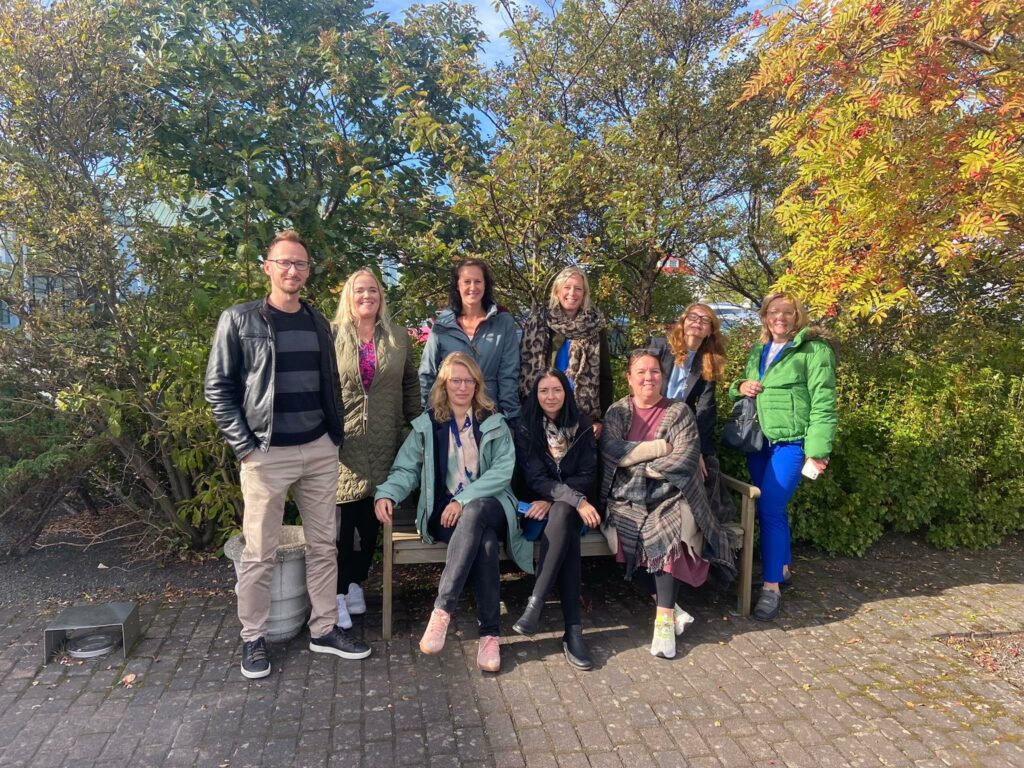
Project meeting at the University of Iceland
The second Remember To Remember project meeting took place on 15-16 November in Reykjavik, Iceland, at the University of Iceland. The members of the project consortium mainly dealt with the development of training materials and how to involve the target group. Next meetings of project managers from the Czech Republic, Belgium, Poland and Iceland will take place in spring 2023 at the HOGENT university.
International project Remember To Remember aims to combine cognitive rehabilitation and modern technologies (17.2.2022)
The unique international project Remeber To Remember within the Erasmus+ KA220-SCH programme, which combines the topics of neuropsychology, biomedicine and education, was launched with a joint meeting of researchers from four partner universities on 15 February 2022 at the University of Mining and Metallurgy – Technical University of Ostrava, which is the coordinator of the project.
Besides the University of Iceland, HOGENT University of Applied Sciences and Arts and the University of Bielsko-Biala are participating in the project. “The project plan is ambitious not only in the aim to connect state-of-the-art technologies with the field of cognitive and metacognitive training, but also to subsequently transfer the developed tools into educational and clinical practice,” says Tereza Benešová, the main project coordinator for the Project Support Centre of VŠB – TUO.
The main goal of the project is to develop intervention tools to strengthen metacognitive functions in children with learning disabilities or autism. “We often encounter that learning disabilities can be influenced by deficits at the metacognitive level and manifest themselves especially in the natural environment,” explains Kristín Harðardóttir, Director of the Educational Research Institute in Reykjavik, who attended the kick-off meeting at the VŠB – Technical University of Ostrava.
For example, a special non-invasive technique for monitoring the brain using functional near-infrared spectroscopy, newly used by the Department of Cybernetics and Biomedical Engineering, will be used to assess the effectiveness of the developed tools. In addition to the consortium of 4 universities, external partners from clinical and educational practice in each partner country will also participate in the development of rehabilitation tools. The project will run until the end of 2024.
About
Applicant: VŠB – Technical University of Ostrava, Project Support Centre
Partners:
VYSOKÁ ŠKOLA BÁŇSKÁ – TECHNICKÁ UNIVERZITA OSTRAVA
HASKOLI ISLANDS
HOGESCHOOL GENT
AKADEMIA TECHNICZNO-HUMANISTYCZNA W BIELSKU-BIALEJ
Project identification code: 2021-1-CZ01-KA220-SCH-000032703
Project duration: January 2022 – December 2024, (36 months)
Financed by: Erasmus+ Programme, Cooperation for innovation and the exchange of good practices, KA201 – Strategic Partnerships for school education
The main project objective
The main objective of the project is to develop a tool for Prospective memory and Metacognitive training, particularly for the group of children with learning disabilities and/or Autism Spectrum Disorder (ASD). This tool can be used by children and their families and trained special pedagogs and school counsellors.
Sub – objectives of the project
This project aims to extend the possibilities of school interventions in cognitive training, specifically adapted for children with ASD and/or learning disabilities. The project activities include monitoring and intervention, preventive and early intervention approaches for educational learners with difficulties, promotion of more targeted approaches to education participants, and promotion of mental health among education. At the school level, this project supports a holistic approach to learning and collaboration between all actors within the schools, as well as with families and other external stakeholders. Finally, at the strategic level, it focuses on improving cooperation and functional networking among families with children with learning disabilities, teachers, school counsellors and experts in the field of inclusive education.
Project partners
VSB – Technical University of Ostrava is a public institution of higher education which provides tertiary education in more than one hundred accredited educational programmes in engineering, IT, technology, economics and business related branches. A wide range of high quality, Czech and English taught programmes are offered within seven Faculties and two all-University Programmes. Currently, around 15,000 students are enrolled at the university. Each year the university welcomes around 1400 international students.
The Bussiness Centre is a specialised organisational unit of the VSB-TUO responsible for developmental activities in the field of science-industry collaboration, knowledge transfer and career development of students and graduates. The Centre co-operates closely with individual departments as well as other units of the university, research organisations and public sector institutions. It consists of three specific parts – Projects Support Centre, Entrepreneurship and Career Centre and R&D Results Commercialisation. The main activities include:
Integration of the university into research projects. The Centre looks for suitable projects and programmes, which can be attractive for collaborative activities of the university, and conducts collaborative projects
Entrepreneurship support, programs for young entrepreneurs and star ups, internships, internationalisation of business
Support to IPR commercialisation and operation of the business incubator.
The University of Iceland (UI) is the leading institution of research and higher education in Iceland; it is a progressive educational and scientific institution, renowned for research in the global scientific community. The University of Iceland is a state university, situated in the heart of Reykjavík, the capital of Iceland. A modern, diversified, and rapidly developing institution, the UI offers opportunities for study and research in 400 programs, spanning most fields of science and scholarship. The UI is organized into five schools: Social Sciences,
Health Sciences, Humanities, Education, Natural Sciences, and Engineering. Over fifteen thousand students are enrolled and around seventeen hundred in permanent staff and faculty + almost four thousand part-time teachers are in its employ.
The School of Education at the University of Iceland educates teachers for preschools, primary schools, and upper secondary schools, sports and health sciences, social educators, and leisure professionals. All academic programs at the School of Education are strongly linked to the workplaces of those professions the school educates, such as schools and other societal institutions. The programs provide a wide range of professional options and serve as a good foundation for further studies. The School of Education is divided into four faculties: the faculty of Education and Diversity, the faculty of Education and Pedagogy, the faculty of Health Promotion, Sport and Leisure Studies and the faculty of Subject Teacher Education.
The School of Education is the principal institution in the fields of education and training in Iceland, and has around 4.414 students enrolled in programs, and an increasing number of master’s and doctoral students. In the year 2022, there were 68 doctoral students and 1.829 master’s students doing their graduate degree training at the School of Education, many from other European countries. The School of Education also hosts vibrant exchange student programs. At the School of Education diverse research is carried out in the field of education, pedagogy and training for the purpose of creating new knowledge for the benefit of society.
The faculty at the School of Education comes from diverse scholarly and vocational disciplines, providing a truly interdisciplinary training and research in the field of education. As a result, research collaboration is common, both domestically and with researchers and teams in Europe. Emphasis is placed on a strong support service for teaching, studying and research, and the support service alone employs about 45 people.
Twenty-tree research centres belong to the School of Education, all of them fall under the Educational Research Institute. The School of Education, mostly through research enjoys close ties with the workplace, especially as it provides advice, empirical evidence, and guidelines for those interested in education, training, and skills acquisition
HOGENT University of Applied Sciences and Arts, public institution with legal personality, consists of 7 Schools (School of Teacher Training, School of Healthcare, School of Social Welfare, School of Built Environment, School of IT and Digital Innovation, School of Business and Management, School of Bioscience and Industrial Technology), the Royal Academy of Fine Arts & Royal Conservatory and GO5 (associate degrees – EQF 5). The Service Centre with 11 Offices (Education, Research, Communication,…) support the Schools and Departments. On eight campuses in Ghent, Aalst and Melle, HOGENT has over 17,000 students and 2,150 staff members, including 275 researchers who are active in over a hundred national and international research projects. Since the 2020-2021 academic year, HOGENT’s practice-based scientific research has been brought together in a Centre for Applied Data Science and eleven interdisciplinary research centres. Research Centre for Learning in Diversity (OZC-LDIV) is one of these centres. In this interdisciplinary research centre, applied research is conducted on topics such as formal and informal learning, typical and atypical learning and learning throughout the life span. When investigating ‘learning’, both the diversity within learners and the diverse contexts in which learning occurs are taken into account. Doing so, the ultimate aim is to contribute to equal access to qualitative education and lifelong learning for all. HOGENT is one of the 8 partners of the Urban Research and Educational Knowledge Alliance (U!REKA) since 2016.
The University of Bielsko-Biala (Akademia Techniczno-Humanistyczna w Bielsku-Bialej) was founded in October 2001 as an independent governmental academic institution. Previously, since 1969, it had been a branch of the Technical University of Lodz (Politechnika Łódzka). At present, about 5,000 students study at five faculties including the Faculty of Humanities and Social Sciences. As the only state educational institution in the Podbeskidzie region which provides teritary education, the University of Bielsko-Biala has a vibrant community of ambitious individuals who contribute to the University’s research and didactic potential by constantly attaining their professional, educational and social goals. The University is firmly rooted in the region which is reflected in various enterprises with members of the community and also in its research interests. The University of Bielsko-Biala is open to new ideas and opportunities which can be utilised to improve modern educational tools. Internationalisation has become one of the most important objectives of the University, and as a result, it is being constantly promoted through participation in various European network projects.
Results
The project team will create the complex methodology of the Prospective Memory and Metacognitive Training (under the title Remember To Remember) that, at the end of the project, could be used by childen with learning disabilities, children with ASD and their families and educators. The specific method will be introduced first to experts (special pedagogs, school counsellors and experts in the field of educational psychology and inclusive education) in the testing phase (staff training activity) and then we will organize an online workshop for special educators and school counsellors, that haven´t been involved in the project so far, to introduce the programme to them. The material will be in English, but after the testing phase, it will be translated and used by any user in all involved countries.
This innovative and attractive tool will represent a new approach to better support children with disabilities and the development of their key metacognitive competencies.
On the basis of scientific interest in the topic, a team from all participating universities will prepare the Research monographs – the specialist publications dealing with the topic of Prospective Memory and Metacognitive Training in the form of a book.
The results will contribute to increase in:
- * quality of life of children and their families – both subjectively and objectively;
- * psychological well-being of the children; coordination abilities, in ranking multiple activities and planning day-to-day activities;
- * supporting family education – motivation for training at home, doing homeworks;
- RETORE pracovni list – Sebehodnoceni
- RETORE pracovni list – Domaci ukoly
- RETORE pracovni list – Zadani pro administratora
- RETORE pracovni list 1 – Barvy
- RETORE pracovni list 2 – Vyskrtavani
- RETORE pracovni list 3 – Pracovni pamet Fonologicka smycka
- RETORE pracovni list 4 – Pracovni pamet Vizuoprostorovy nacrtnik
- RETORE pracovni list 5 – Pracovni pamet Epizodickě zasobnik
- RETORE pracovni list 6 – Inhibice
- RETORE pracovni list – Prospektivni pamet 1
- RETORE pracovni list – Prospektivni pamet 2
- RETORE pracovni list – Prospektivni pamet 3
- RETORE pracovni list – Prospektivni pamet 4
- RETORE pracovni list – Prospektivni pamet 5
- RETORE – zelfevaluatie van de lln
- RETORE – worksheet – Homework
- RETORE – instructieblad
- RETORE EF – werkblad 1 – Colors
- RETORE EF – werkblad 2 – Cancellation
- RETORE EF – werkblad 3 – Working Memory Phonological Loop
- RETORE EF – werkblad 4 – Working Memory Visuospatial Sketchpad
- RETORE EF – werkblad 5 – Working Memory Episodic Buffer
- RETORE EF – werkblad 6 – Inhibition
- RETORE PM – werkblad 1 – apotheek, klusjes, bioscoop
- RETORE PM – werkblad 2 – school,bib, park
- RETORE PM – werkblad 3 – winkelcentrum, zoo, koffiebar
- RETORE PM – werkblad 4 – kruidenier, thuis, pretpark
- RETORE PM – werkblad 5 – winkelcentrum, bloemenwinkel, kruidenier
- RETORE worksheet – Self-evaluation
- RETORE worksheet – Homework
- RETORE worksheet – Administrator instructions
- RETORE worksheet 1 – Colors
- RETORE worksheet 2 – Cancellation
- RETORE worksheet 3 – Working Memory Phonological Loop
- RETORE worksheet 4 – Working Memory Visuospatial Sketchpad
- RETORE worksheet 5 – Working Memory Episodic Buffer
- RETORE worksheet 6 – Inhibition
- RETORE worksheet – Prospective memory 1
- RETORE worksheet – Prospective memory 2
- RETORE worksheet – Prospective memory 3
- RETORE worksheet – Prospective memory 4
- RETORE worksheet – Prospective memory 5
- RETORE worksheet – Self-evaluation
- RETORE worksheet – Homework
- RETORE worksheet – Administrator instructions
- RETORE worksheet 1 – Colors
- RETORE worksheet 2 – Cancellation
- RETORE worksheet 3 – Working Memory Phonological Loop
- RETORE worksheet 4 – Working Memory Visuospatial Sketchpad
- RETORE worksheet 5 – Working Memory Episodic Buffer
- RETORE worksheet 6 – Inhibition
- RETORE worksheet – Prospective memory 1
- RETORE worksheet – Prospective memory 2
- RETORE worksheet – Prospective memory 3
- RETORE worksheet – Prospective memory 4
- RETORE worksheet – Prospective memory 5
- RETORE worksheet – Self-evaluation
- RETORE – Homework
- RETORE worksheet – Administrator instructions
- RETORE worksheet 1 – Colors
- RETORE worksheet 2 – Cancellation
- RETORE worksheet 3 – Working Memory Phonological Loop
- RETORE worksheet 4 – Working Memory Visuospatial Sketchpad
- RETORE worksheet 5 – Working Memory Episodic Buffer
- RETORE worksheet 6 – Inhibition
- RETORE worksheet – Prospective memory 1
- RETORE worksheet – Prospective memory 2
- RETORE worksheet – Prospective memory 3
- RETORE worksheet – Prospective memory 4
- RETORE worksheet – Prospective memory 5
Let´s train concentration and visual motor skills
Game is an online game designed to train concentration and visual motor skills. The player must quickly and accurately connect matching lines in patterns, thereby developing eye-hand coordination, reaction time and visuomotor coordination. The game offers different levels of difficulty that gradually increase the difficulty of the tasks, thus promoting cognitive flexibility and attention.
The combination of motor training (e.g. hand movements, fine motor skills) and cognitive training, in this case concentration, correction of impulsivity and visuomotor components, helps to improve the link between sensorimotor and cognitive functions, thus promoting more efficient learning, faster reaction times and can promote better coping with everyday activities.
Its simple but effective design makes it suitable for children and adults who want to improve their visual and motor skills, as well as children with neurodevelopmental disorders and adults and seniors with acquired neurological difficulties.
Here is the link to the game
Impact
The impact of the project could be seen from three perspectives:
School children´s perspective:
School children with learning disabilities and/or ASD will enhance their prospective memory and metacognitive competence. They will build their ability of planning, controlling, self reflection. Metacognition is one of the most effective and cost-efficient ways to help students advance their learning. It will enable them to have high self – awareness and control of their thoughts and choose appropriate cognitive strategies for various tasks which play an important role in sustainable learning. Altogether, it will increase students´ school performance and preparedness for future career.
Teachers´/trainers´ perspective:
Special teachers, school counsullers will enhance their ability of supporting children with special needs in the way of prospective memory and metacognitive training. School counselors are an essential resource and great partners for teachers. Today’s professional counselors proactively search for innovative ways to meet the needs of all students and to maximize their school achievement. Remember To Remember Training can have an impact on how the students are engaged in the learning process and how they solve everyday problems.
University´s perspective:
Universities will also benefit from the developement of this Training Tool and associated Research. The Pedagogical Faculties and Educational Centres can establishe cooperation on inclusive access in education and share experiences with foreign partners. Universities can strengthen current research on the construct of prospective memory; complete prospective memory research on autism spectrum disorders and learning disabilities; expanding insight into the role of prospective memory and executive function in the development of metacognitive skills; developing methods for the training of prospective memory.
News
Publication Remember To Remember: The international experience of prospective memory training (between theory and practice)
12.12.2024
In December, the team of authors presented the publication Remember To Remember: The international experience of prospective memory training (between theory and practice). Memory research and training is a frequent and popular topic in psychological research and practice. Yet the topic of prospective memory, i.e. memory for the future, is not well known in professional or lay discourse.
The international project Remember To Remember (2021-1-CZ01-KA220-SCH-000032703) involved teams from VSB-Technical University Ostrava, University of Iceland, Hogeschool GENT and Akademia techniczno-humanistyczna in Bielsko-bialej. The project focused specifically on training prospective memory in adolescents with learning difficulties and/or neurodevelopmental disorders. In the publication REMEMBER TO REMEMBER: The international experience of prospective memory training (between theory and practice) 2021-1-CZ01-KA220-SCH-000032703, a theoretical perspective on the topic of prospective memory training is offered and combined with practical findings from training conducted in the Czech Republic, Iceland, Belgium and Poland. Prospective memory falls among very important cognitive functions, therefore, training it throughout the whole life is of the highest importance.
The international experience of prospective memory training (between theory and practice)
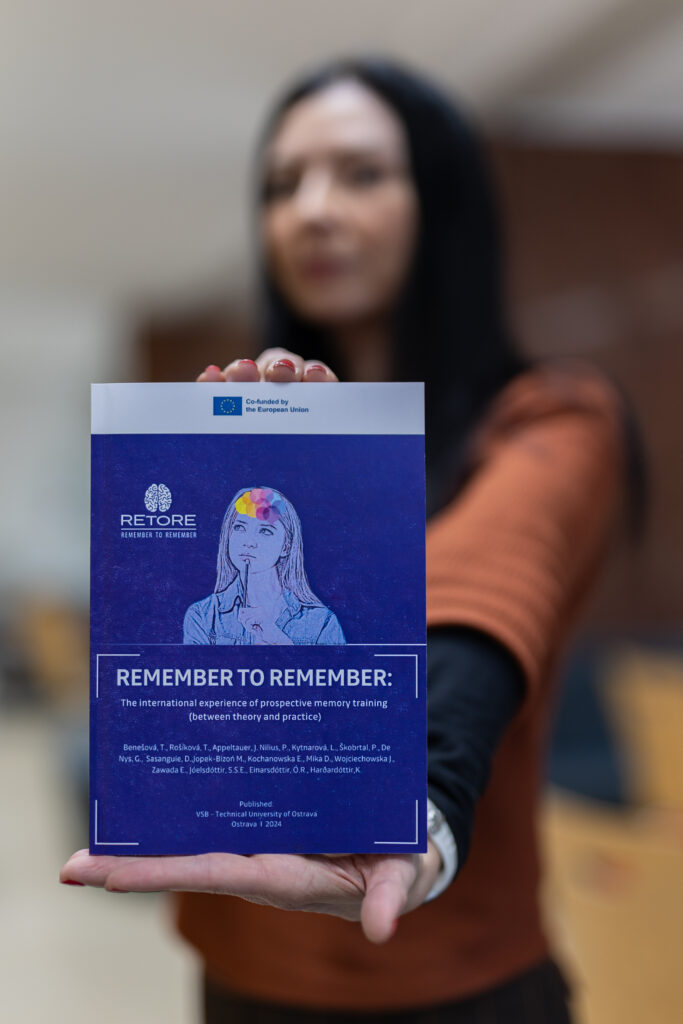
Multiplier Event in Iceland
3.12.2024
The Multiplier Event in Iceland was held on the 03.12.2024. The event took place in Áltanesskóli, the school that took part in the testing of the material with us. Most of the teachers form the school participated in the Multiplier event or 35 teachers.
The purpose of the event was to disseminate our findings from the project, explain the purpose of the project, how the kids did in the testing and give the teachers opportunity to examen the materials made for the project and test the proxy cubes.
Ther was a lot of discussions and questions – and the teachers were very enthusiastic about the project.
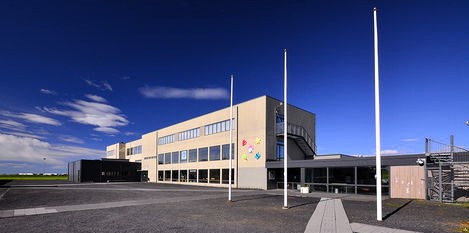
Remember To Remember Conference
29.11.2024
In November, a conference on Metacognition and prospective memory as tools for effective functioning in everyday life took place at the VSB – Technical University of Ostrava. The conference summarized the outcomes of the Remember To Remember project and at the same time introduced the topics of metacognition and prospective memory to the general and professional public. The programme featured, among others, Kamila Urban, an expert in cognitive and metacognitive development, clinical psychologist and psychotherapist Petr Nilius, neuropsychologist Tereza Rošíková. Special guest was Dominik Kniezek, a student with Asperger’s syndrome.


HOGENT School presented the results of the Remember To Remember project
19.11.2024
Giving and receiving inspiration during our study day Remember To Remember; the closing event of our Erasmus+ project on prospective memory, executive functions and metacognition in students with learning difficulties or disorders. Attendees eagerly tested the project’s test materials during the game carousel, shared practical info and materials at the inspiration market and heard the first research results.



Presentation of RETORE project outputs in Poland
13.11.2024
On November 13th 2024, the University of Bielsko-Biala hosted a conference summarizing the intellectual results of the project entitled Remember to Remember, 2021-1-CZ01-KA220-SCH-000032703, financed under the Erasmus+ program, which was opened by the Vice-Dean of the Faculty of Humanities and Social Sciences, Robert Pysz, PhD.
The conference was attended primarily by teachers teaching in schools where children with special needs are taught, special education teachers, as well as people interested in the topic of the conference from the city and region.
In addition, the event was attended by employees of the Faculty of Humanities and Social Sciences and students of pedagogy, who in the future will take up work in various units related to teaching people with special educational needs or on the autism spectrum.
In total, over 70 people took part in the event during the entire day of the conference, including 32 from outside the University of Bielsko-Biala.

Remember To Remember project prezentation in Bielsko-Biala
In April dr Małgorzata Jopek-Bizoń made two trainings with R2R intellectual project results in Bielsko -Biala.
The first one was organized for the students from English philology (teachr grpu) and pedagogy, they were analyzing the Executive functions and prospective memory sheets, trying in pairs to run the research and replacing their roles.
The second training was undertaken at Specjalny Ośrodek Szkolno-Wychowawczy im. Marii Grzegorzewskiej w Żywcu, where pedagogies, psychologists and teachers were trained and explained how to use Proxy BQ and executive functions and prospective memory tools.
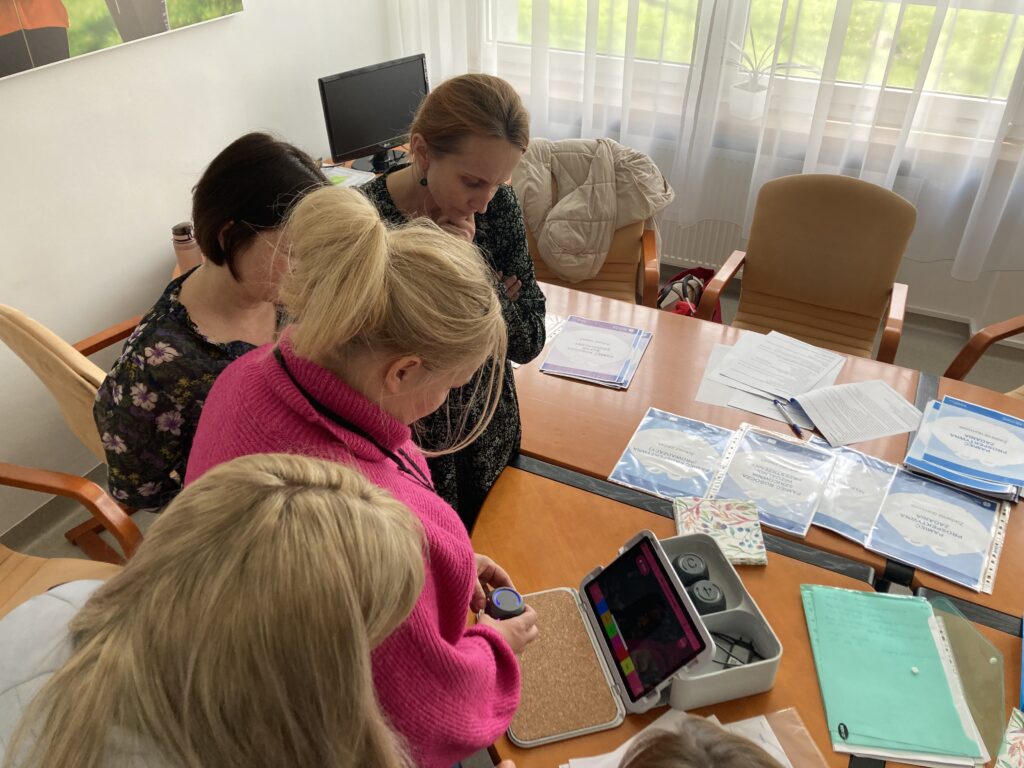

Remember To Remember meeting in Ghent
From 29th to 31st August, a learning, teaching and training activity took place at the Hogent School in Ghent, Belgium. During the meeting, participants from four countries were introduced to the concept of executive function training and prospective memory. Participants learned how to use the PROXYQB evaluation and training cubes and were introduced to the therapy worksheets. At the same time, the Belgian partners introduced the Eureka Leuven, an innovative knowledge and expertise centre for learning disabilities and problems in learning with the central theme ‘From Mankind to Talent’.

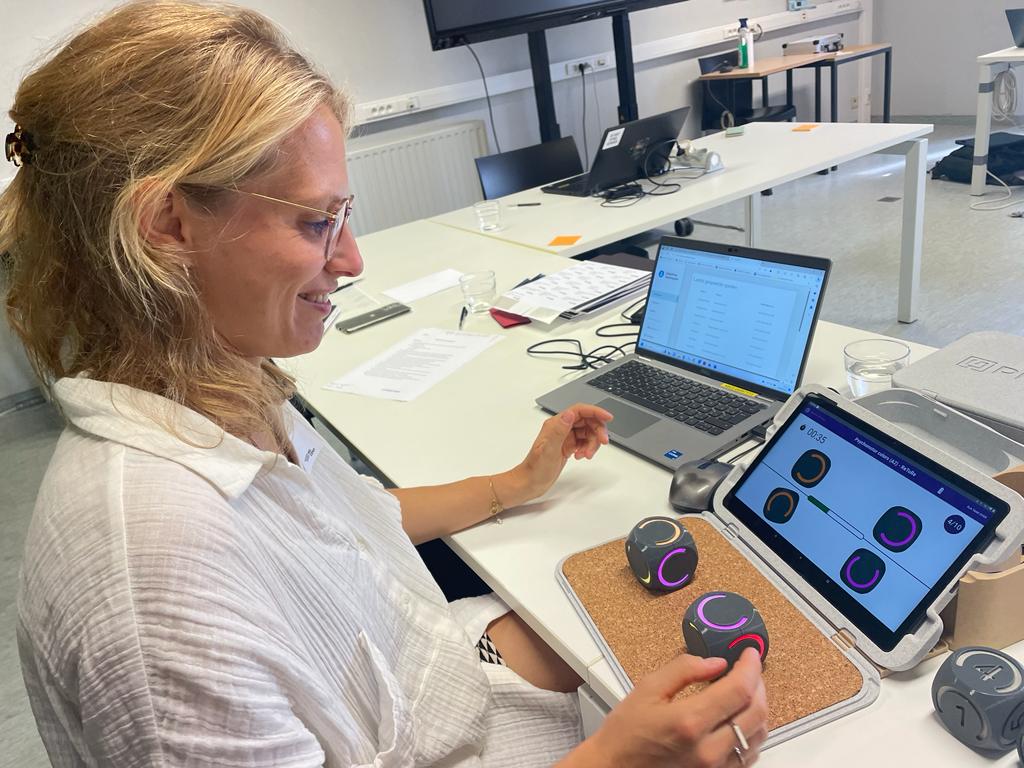



Presentation of the project ReToRe as part of the Brain Week 2023 (14.3.2023)
The Remember To Remember project was presented at the national event Brain Week in the Czech Republic. On March 14, 2023, a workshop was held on the topic of neurorehabilitation as a complex and multidisciplinary problem that requires an innovative approach and synergy of technical, medical and humanities disciplines.
During the workshop at VSB – Technical University of Ostrava, the PROXY QB neurorehabilitation cubes for the development of children’s rational abilities were presented, as well as the intentions of the international project Remember To Remember.

Project meeting at the University of Iceland
The second Remember To Remember project meeting took place on 15-16 November in Reykjavik, Iceland, at the University of Iceland. The members of the project consortium mainly dealt with the development of training materials and how to involve the target group. Next meetings of project managers from the Czech Republic, Belgium, Poland and Iceland will take place in spring 2023 at the HOGENT university.
International project Remember To Remember aims to combine cognitive rehabilitation and modern technologies (17.2.2022)
The unique international project Remeber To Remember within the Erasmus+ KA220-SCH programme, which combines the topics of neuropsychology, biomedicine and education, was launched with a joint meeting of researchers from four partner universities on 15 February 2022 at the University of Mining and Metallurgy – Technical University of Ostrava, which is the coordinator of the project.
Besides the University of Iceland, HOGENT University of Applied Sciences and Arts and the University of Bielsko-Biala are participating in the project. “The project plan is ambitious not only in the aim to connect state-of-the-art technologies with the field of cognitive and metacognitive training, but also to subsequently transfer the developed tools into educational and clinical practice,” says Tereza Benešová, the main project coordinator for the Project Support Centre of VŠB – TUO.
The main goal of the project is to develop intervention tools to strengthen metacognitive functions in children with learning disabilities or autism. “We often encounter that learning disabilities can be influenced by deficits at the metacognitive level and manifest themselves especially in the natural environment,” explains Kristín Harðardóttir, Director of the Educational Research Institute in Reykjavik, who attended the kick-off meeting at the VŠB – Technical University of Ostrava.
For example, a special non-invasive technique for monitoring the brain using functional near-infrared spectroscopy, newly used by the Department of Cybernetics and Biomedical Engineering, will be used to assess the effectiveness of the developed tools. In addition to the consortium of 4 universities, external partners from clinical and educational practice in each partner country will also participate in the development of rehabilitation tools. The project will run until the end of 2024.
About
Applicant: VŠB – Technical University of Ostrava, Project Support Centre
Partners:
VYSOKÁ ŠKOLA BÁŇSKÁ – TECHNICKÁ UNIVERZITA OSTRAVA
HASKOLI ISLANDS
HOGESCHOOL GENT
AKADEMIA TECHNICZNO-HUMANISTYCZNA W BIELSKU-BIALEJ
Project identification code: 2021-1-CZ01-KA220-SCH-000032703
Project duration: January 2022 – December 2024, (36 months)
Financed by: Erasmus+ Programme, Cooperation for innovation and the exchange of good practices, KA201 – Strategic Partnerships for school education
The main project objective
The main objective of the project is to develop a tool for Prospective memory and Metacognitive training, particularly for the group of children with learning disabilities and/or Autism Spectrum Disorder (ASD). This tool can be used by children and their families and trained special pedagogs and school counsellors.
Sub – objectives of the project
This project aims to extend the possibilities of school interventions in cognitive training, specifically adapted for children with ASD and/or learning disabilities. The project activities include monitoring and intervention, preventive and early intervention approaches for educational learners with difficulties, promotion of more targeted approaches to education participants, and promotion of mental health among education. At the school level, this project supports a holistic approach to learning and collaboration between all actors within the schools, as well as with families and other external stakeholders. Finally, at the strategic level, it focuses on improving cooperation and functional networking among families with children with learning disabilities, teachers, school counsellors and experts in the field of inclusive education.
Project partners
VSB – Technical University of Ostrava is a public institution of higher education which provides tertiary education in more than one hundred accredited educational programmes in engineering, IT, technology, economics and business related branches. A wide range of high quality, Czech and English taught programmes are offered within seven Faculties and two all-University Programmes. Currently, around 15,000 students are enrolled at the university. Each year the university welcomes around 1400 international students.
The Bussiness Centre is a specialised organisational unit of the VSB-TUO responsible for developmental activities in the field of science-industry collaboration, knowledge transfer and career development of students and graduates. The Centre co-operates closely with individual departments as well as other units of the university, research organisations and public sector institutions. It consists of three specific parts – Projects Support Centre, Entrepreneurship and Career Centre and R&D Results Commercialisation. The main activities include:
Integration of the university into research projects. The Centre looks for suitable projects and programmes, which can be attractive for collaborative activities of the university, and conducts collaborative projects
Entrepreneurship support, programs for young entrepreneurs and star ups, internships, internationalisation of business
Support to IPR commercialisation and operation of the business incubator.
The University of Iceland (UI) is the leading institution of research and higher education in Iceland; it is a progressive educational and scientific institution, renowned for research in the global scientific community. The University of Iceland is a state university, situated in the heart of Reykjavík, the capital of Iceland. A modern, diversified, and rapidly developing institution, the UI offers opportunities for study and research in 400 programs, spanning most fields of science and scholarship. The UI is organized into five schools: Social Sciences,
Health Sciences, Humanities, Education, Natural Sciences, and Engineering. Over fifteen thousand students are enrolled and around seventeen hundred in permanent staff and faculty + almost four thousand part-time teachers are in its employ.
The School of Education at the University of Iceland educates teachers for preschools, primary schools, and upper secondary schools, sports and health sciences, social educators, and leisure professionals. All academic programs at the School of Education are strongly linked to the workplaces of those professions the school educates, such as schools and other societal institutions. The programs provide a wide range of professional options and serve as a good foundation for further studies. The School of Education is divided into four faculties: the faculty of Education and Diversity, the faculty of Education and Pedagogy, the faculty of Health Promotion, Sport and Leisure Studies and the faculty of Subject Teacher Education.
The School of Education is the principal institution in the fields of education and training in Iceland, and has around 4.414 students enrolled in programs, and an increasing number of master’s and doctoral students. In the year 2022, there were 68 doctoral students and 1.829 master’s students doing their graduate degree training at the School of Education, many from other European countries. The School of Education also hosts vibrant exchange student programs. At the School of Education diverse research is carried out in the field of education, pedagogy and training for the purpose of creating new knowledge for the benefit of society.
The faculty at the School of Education comes from diverse scholarly and vocational disciplines, providing a truly interdisciplinary training and research in the field of education. As a result, research collaboration is common, both domestically and with researchers and teams in Europe. Emphasis is placed on a strong support service for teaching, studying and research, and the support service alone employs about 45 people.
Twenty-tree research centres belong to the School of Education, all of them fall under the Educational Research Institute. The School of Education, mostly through research enjoys close ties with the workplace, especially as it provides advice, empirical evidence, and guidelines for those interested in education, training, and skills acquisition.
HOGENT University of Applied Sciences and Arts, public institution with legal personality, consists of 7 Schools (School of Teacher Training, School of Healthcare, School of Social Welfare, School of Built Environment, School of IT and Digital Innovation, School of Business and Management, School of Bioscience and Industrial Technology), the Royal Academy of Fine Arts & Royal Conservatory and GO5 (associate degrees – EQF 5). The Service Centre with 11 Offices (Education, Research, Communication,…) support the Schools and Departments. On eight campuses in Ghent, Aalst and Melle, HOGENT has over 17,000 students and 2,150 staff members, including 275 researchers who are active in over a hundred national and international research projects. Since the 2020-2021 academic year, HOGENT’s practice-based scientific research has been brought together in a Centre for Applied Data Science and eleven interdisciplinary research centres. Research Centre for Learning in Diversity (OZC-LDIV) is one of these centres. In this interdisciplinary research centre, applied research is conducted on topics such as formal and informal learning, typical and atypical learning and learning throughout the life span. When investigating ‘learning’, both the diversity within learners and the diverse contexts in which learning occurs are taken into account. Doing so, the ultimate aim is to contribute to equal access to qualitative education and lifelong learning for all. HOGENT is one of the 8 partners of the Urban Research and Educational Knowledge Alliance (U!REKA) since 2016.
The University of Bielsko-Biala (Akademia Techniczno-Humanistyczna w Bielsku-Bialej) was founded in October 2001 as an independent governmental academic institution. Previously, since 1969, it had been a branch of the Technical University of Lodz (Politechnika Łódzka). At present, about 5,000 students study at five faculties including the Faculty of Humanities and Social Sciences. As the only state educational institution in the Podbeskidzie region which provides teritary education, the University of Bielsko-Biala has a vibrant community of ambitious individuals who contribute to the University’s research and didactic potential by constantly attaining their professional, educational and social goals. The University is firmly rooted in the region which is reflected in various enterprises with members of the community and also in its research interests. The University of Bielsko-Biala is open to new ideas and opportunities which can be utilised to improve modern educational tools. Internationalisation has become one of the most important objectives of the University, and as a result, it is being constantly promoted through participation in various European network projects.
Results
The project team will create the complex methodology of the Prospective Memory and Metacognitive Training (under the title Remember To Remember) that, at the end of the project, could be used by childen with learning disabilities, children with ASD and their families and educators. The specific method will be introduced first to experts (special pedagogs, school counsellors and experts in the field of educational psychology and inclusive education) in the testing phase (staff training activity) and then we will organize an online workshop for special educators and school counsellors, that haven´t been involved in the project so far, to introduce the programme to them. The material will be in English, but after the testing phase, it will be translated and used by any user in all involved countries.
This innovative and attractive tool will represent a new approach to better support children with disabilities and the development of their key metacognitive competencies.
On the basis of scientific interest in the topic, a team from all participating universities will prepare the Research monographs – the specialist publications dealing with the topic of Prospective Memory and Metacognitive Training in the form of a book.
The results will contribute to increase in:
- * quality of life of children and their families – both subjectively and objectively;
- * psychological well-being of the children; coordination abilities, in ranking multiple activities and planning day-to-day activities;
- * supporting family education – motivation for training at home, doing homeworks;
- RETORE pracovni list – Sebehodnoceni
- RETORE pracovni list – Domaci ukoly
- RETORE pracovni list – Zadani pro administratora
- RETORE pracovni list 1 – Barvy
- RETORE pracovni list 2 – Vyskrtavani
- RETORE pracovni list 3 – Pracovni pamet Fonologicka smycka
- RETORE pracovni list 4 – Pracovni pamet Vizuoprostorovy nacrtnik
- RETORE pracovni list 5 – Pracovni pamet Epizodickě zasobnik
- RETORE pracovni list 6 – Inhibice
- RETORE pracovni list – Prospektivni pamet 1
- RETORE pracovni list – Prospektivni pamet 2
- RETORE pracovni list – Prospektivni pamet 3
- RETORE pracovni list – Prospektivni pamet 4
- RETORE pracovni list – Prospektivni pamet 5
- RETORE – zelfevaluatie van de lln
- RETORE – worksheet – Homework
- RETORE – instructieblad
- RETORE EF – werkblad 1 – Colors
- RETORE EF – werkblad 2 – Cancellation
- RETORE EF – werkblad 3 – Working Memory Phonological Loop
- RETORE EF – werkblad 4 – Working Memory Visuospatial Sketchpad
- RETORE EF – werkblad 5 – Working Memory Episodic Buffer
- RETORE EF – werkblad 6 – Inhibition
- RETORE PM – werkblad 1 – apotheek, klusjes, bioscoop
- RETORE PM – werkblad 2 – school,bib, park
- RETORE PM – werkblad 3 – winkelcentrum, zoo, koffiebar
- RETORE PM – werkblad 4 – kruidenier, thuis, pretpark
- RETORE PM – werkblad 5 – winkelcentrum, bloemenwinkel, kruidenier
- RETORE worksheet – Self-evaluation
- RETORE worksheet – Homework
- RETORE worksheet – Administrator instructions
- RETORE worksheet 1 – Colors
- RETORE worksheet 2 – Cancellation
- RETORE worksheet 3 – Working Memory Phonological Loop
- RETORE worksheet 4 – Working Memory Visuospatial Sketchpad
- RETORE worksheet 5 – Working Memory Episodic Buffer
- RETORE worksheet 6 – Inhibition
- RETORE worksheet – Prospective memory 1
- RETORE worksheet – Prospective memory 2
- RETORE worksheet – Prospective memory 3
- RETORE worksheet – Prospective memory 4
- RETORE worksheet – Prospective memory 5
- RETORE worksheet – Self-evaluation
- RETORE worksheet – Homework
- RETORE worksheet – Administrator instructions
- RETORE worksheet 1 – Colors
- RETORE worksheet 2 – Cancellation
- RETORE worksheet 3 – Working Memory Phonological Loop
- RETORE worksheet 4 – Working Memory Visuospatial Sketchpad
- RETORE worksheet 5 – Working Memory Episodic Buffer
- RETORE worksheet 6 – Inhibition
- RETORE worksheet – Prospective memory 1
- RETORE worksheet – Prospective memory 2
- RETORE worksheet – Prospective memory 3
- RETORE worksheet – Prospective memory 4
- RETORE worksheet – Prospective memory 5
- RETORE worksheet – Self-evaluation
- RETORE – Homework
- RETORE worksheet – Administrator instructions
- RETORE worksheet 1 – Colors
- RETORE worksheet 2 – Cancellation
- RETORE worksheet 3 – Working Memory Phonological Loop
- RETORE worksheet 4 – Working Memory Visuospatial Sketchpad
- RETORE worksheet 5 – Working Memory Episodic Buffer
- RETORE worksheet 6 – Inhibition
- RETORE worksheet – Prospective memory 1
- RETORE worksheet – Prospective memory 2
- RETORE worksheet – Prospective memory 3
- RETORE worksheet – Prospective memory 4
- RETORE worksheet – Prospective memory 5
Let´s train concentration and visual motor skills
Game is an online game designed to train concentration and visual motor skills. The player must quickly and accurately connect matching lines in patterns, thereby developing eye-hand coordination, reaction time and visuomotor coordination. The game offers different levels of difficulty that gradually increase the difficulty of the tasks, thus promoting cognitive flexibility and attention.
The combination of motor training (e.g. hand movements, fine motor skills) and cognitive training, in this case concentration, correction of impulsivity and visuomotor components, helps to improve the link between sensorimotor and cognitive functions, thus promoting more efficient learning, faster reaction times and can promote better coping with everyday activities.
Its simple but effective design makes it suitable for children and adults who want to improve their visual and motor skills, as well as children with neurodevelopmental disorders and adults and seniors with acquired neurological difficulties.
Impact
The impact of the project could be seen from three perspectives:
School children´s perspective
School children with learning disabilities and/or ASD will enhance their prospective memory and metacognitive competence. They will build their ability of planning, controlling, self reflection. Metacognition is one of the most effective and cost-efficient ways to help students advance their learning. It will enable them to have high self – awareness and control of their thoughts and choose appropriate cognitive strategies for various tasks which play an important role in sustainable learning. Altogether, it will increase students´ school performance and preparedness for future career.
Teachers´/trainers´ perspective
Special teachers, school counsullers will enhance their ability of supporting children with special needs in the way of prospective memory and metacognitive training. School counselors are an essential resource and great partners for teachers. Today’s professional counselors proactively search for innovative ways to meet the needs of all students and to maximize their school achievement. Remember To Remember Training can have an impact on how the students are engaged in the learning process and how they solve everyday problems.
University´s perspective
Universities will also benefit from the developement of this Training Tool and associated Research. The Pedagogical Faculties and Educational Centres can establishe cooperation on inclusive access in education and share experiences with foreign partners. Universities can strengthen current research on the construct of prospective memory; complete prospective memory research on autism spectrum disorders and learning disabilities; expanding insight into the role of prospective memory and executive function in the development of metacognitive skills; developing methods for the training of prospective memory.
